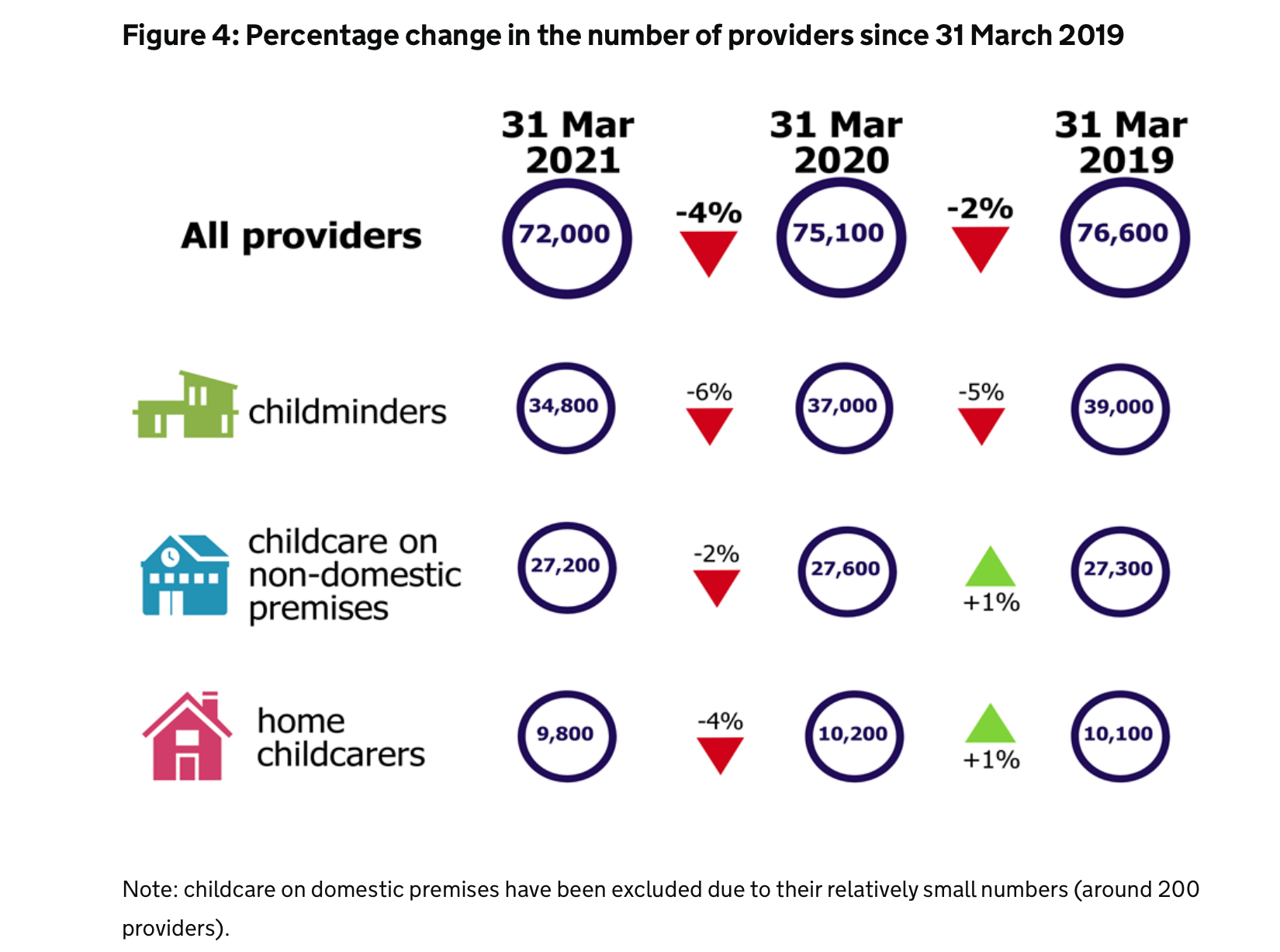
Statistics for the first quarter of 2021, up until the end of March, show that the number of childcare providers registered with Ofsted has fallen by 3,300 to 72,000 since 31 August 2020.
This continues an ongoing decline, particularly among childminder numbers.
Between 1 April 2020 and 31 March 2021, there was a net overall decrease of around 3,000 providers. This was slightly above the average across the last six years, Ofsted said.
The figures show that the drop has been driven by a fall in childminders, with a loss of 1,800, or 5 per cent, since 31 August.
Childminder numbers have fallen by 27 per cent since August 2015, with the number of providers overall falling by 17 per cent (15,100) over the same time period.
Ofsted said, 'Most of this overall decrease in provider numbers over time is due to a substantial fall in the number of childminders. Childminders make up nearly half of all registered providers. In the last 2 years we have seen a 5 per cent (2019–20) and 6 per cent (2020–21) decrease in their numbers (see Figure 4). Meanwhile, providers on non-domestic premises have remained fairly stable.'
However, overall place numbers remain relatively stable.


Source: Ofsted, Childcare Providers and Inspections as at 31 March 2021
Regional differences
Across England, each region saw a fall in provider numbers between 1 April 2020 and 31 March 2021. London had the smallest percentage decrease (-1 per cent), while the North East (-5 per cent), Yorkshire and The Humber (-5 per cent), East Midlands (-5 per cent), East of England (-5 per cent), South East (-5 per cent) and South West (-5 per cent) all had the largest decreases.
In 2020–21, most regions had a similar or higher percentage decrease in providers compared to the two previous years (2018–19 and 2019–20). The only exceptions were the North West and London. In the North West and London, the decrease was higher in 2018–19 but lower in 2019–20.
The proportion of early years settings achieving Good or Outstanding Ofsted ratings remains the same, at 96 per cent. Inspections have been largely suspended during the pandemic, although Ofsted has continued with regulatory activity.
Liz Bayram, chief executive of the Professional Association for Childcare and Early Years (PACEY), said, 'This is no surprise to PACEY as this decline in England has been taking place over many years now. The pandemic has accelerated it with many registered childminders pushed to breaking point due to the pandemic, facing reduced income due temporary closures and shifts in family working patterns that are changing childcare needs. This disruption is likely to continue for many more months to come.
'We continue to push the Department for Education to put in place a sustained and long-term plan to support childcare and early years providers including childminders to thrive. This starts with increasing the levels of funding for providers delivering early education entitlements. Childminding is in decline because less people are choosing it as a profession because it is undervalued and poorly paid.
'Time and time again we hear from childminders that they can earn more working in the local supermarket. So we have to encourage more childminder registrations, but as part of a wider plan to address the sector’s low pay, low morale and high staff turnover. If we don’t, then our youngest children won’t receive the high quality early education that they deserve.'
Commenting, Neil Leitch, Early Years Alliance chief executive, said, ‘We remain deeply concerned by the consistent downward trend in the number of providers in the early years sector, with childminders continually the worst hit.
‘Ministers claim that they are putting record investment into the early years and yet, as our recent Freedom of Information investigation showed, the Government has knowingly underfunded our sector for years, putting the affordability, quality and sustainability of early education and childcare provision at risk.
‘The fact that 96 per cent of providers continue to be rated as “good” or “outstanding” is testament to the commitment and professionalism of the early years workforce. However, the harsh reality is that without quick and decisive intervention, many of the settings currently providing these high-quality services may not be able to stay open for much longer.’
Tulip Siddiq MP, Labour’s shadow children and early years minister, said, 'These childcare closures are the direct consequence of the Government’s decision to underfund early years education, which they knew would increase costs for parents and destabilise providers.
'Early years education and childcare must be a key part of our recovery from Covid, and the Conservatives are proving time and time again that they can’t be trusted to prioritise it.'
